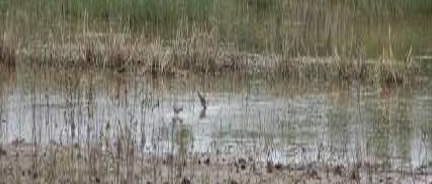Development of fish and amphibian rapid assessment protocol for wetlands:
linking management to wetland system processes

Objectives:
- 1) What is the influence of floodplain/stream connectivity between intensively managed wetlands and passively managed wetlands?
- 2) What influence does floodplain topographic restoration have in providing habitat for fish and amphibians?
- 3) In highly altered systems, can wetland managers effectively emulate water distribution on the landscape to mimic historic river hydrographs to benefit a wide suite of species?
Overview:
Manipulating water levels within wetland complexes mimics wetland ecosystem processes to ensure habitat conditions vary both in time and space to benefit a wide range of wetland-dependent species. Although providing seasonally flooded habitats to accommodate the needs of migratory water birds is a priority on Missouri’s actively managed wetland areas, these floodplain conditions are also used by a wide-variety of other wetland dependent species. Wetland dependent taxa such as fish and amphibians are difficult to detect, resulting in management decisions made with the assumption that an action beneficial to one suite of species will also benefit a wider range of species. However, there is uncertainty associated with this assumption. Better informed management decisions based on monitoring could result in certain management actions that are delayed or expedited to benefit an alternate taxonomic group without sacrificing the primary management objective. However, for a monitoring effort to be useful to managers, it must include efficient and effective sampling methods targeted at a specific group of species that provides a direct link between species response and management actions. Information regarding seasonal fish and amphibian species composition and use of floodplain habitats would help inform wetland management decisions. This would provide managers with a better understanding of how needs of lesser-known species can be incorporated into management actions without detrimental effects to more traditional management activities.
Acknowledgements
- Investigator: MS student (TBD)
- Project Supervisors: Dr. Lisa Webb and Dr. Craig Paukert
- Funding: Missouri Department of Conservation
- Cooperators: Numerous state wetland managers and researchers in Missouri
- Location: Missouri
- Expected Date of Completion: June 2017